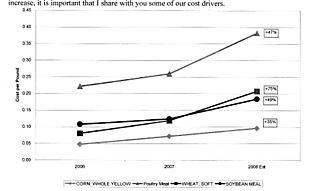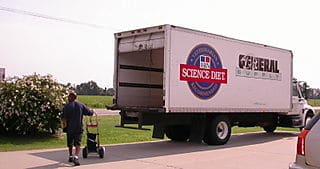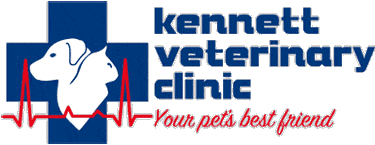 The old time livestock feed industry used to have a tongue-in-cheek motto: "The way to make money is to remember that 1,800 pounds of grain makes a ton of feed." In other words, add some inexpensive filler to adulterate the feed. This would be the same philosophy that resulted in the Chinese sending us poisonous pet-food ingredients last year.
The old time livestock feed industry used to have a tongue-in-cheek motto: "The way to make money is to remember that 1,800 pounds of grain makes a ton of feed." In other words, add some inexpensive filler to adulterate the feed. This would be the same philosophy that resulted in the Chinese sending us poisonous pet-food ingredients last year.
This would make a livestock-feed company branching out into pet food somewhat suspect in those bad old days. Even today, it's certainly possible to buy lousy pet food. A food doesn't have to be a national brand and heavily advertised in order to be good. On the other hand, generic and house-brand foods have their nutritional formulas worked out on paper, rather than being actually fed to pets for evaluation of their performance. Beware of "Dog Food" if "food" is misspelled.
 Premium diets cost more than others because (at least theoretically) the company's nutritional research has found what they believe to be an optimum formula, and they stick to this "fixed formula" when manufacturing the food. They build in a fudge factor to give themselves some margin if the cost of ingredients rise. The Science Diet people were kind enough to send me this graph of the rising cost of ingredients when they apologized for raising prices again. Be sure and thank your legislators for corn-based ethanol subsidies.
Premium diets cost more than others because (at least theoretically) the company's nutritional research has found what they believe to be an optimum formula, and they stick to this "fixed formula" when manufacturing the food. They build in a fudge factor to give themselves some margin if the cost of ingredients rise. The Science Diet people were kind enough to send me this graph of the rising cost of ingredients when they apologized for raising prices again. Be sure and thank your legislators for corn-based ethanol subsidies.
This is in contrast to a market-based formula approach. In the market-based approach, you maintain a nutritious food, but if corn is cheaper this month, you put in more corn. If soybeans are cheaper, you put in more soybeans. This explains why you can buy the same brand of food and it looks a little different from one bag to the next (probably tastes different, too – try some next time).
Every time someone brings in a new pet, I ask them what they are feeding it. Over time, this gives me a pretty good idea of how a food performs in the real world (versus their advertising). There are lots of good foods out there, and I don't make any big effort to switch people over (unless they're feeding junk and the pet actually has health problems resulting from it).
Clients frequently ask, "What do you think is the best food for my pet?" Long before I started selling the stuff, I recommended Science Diet because of my good experience feeding it. "Where can I buy it?" "You can drive fifty miles to a big pet store, or I could order you a bag. I'm not selling dog food here. I'm a doctor."
"Why don't you sell it?" It takes up a huge amount of space, the mark-up is pitifully low, and it's not medicine… except for the prescription diets, which are medicine… sort of. Okay, I do sell those.
 The bottom line is this: veterinary medicine is a service business. When clients ask for something over and over again, you'd be wise to get it for them. It's nice to see people stop in for food when there's nothing wrong with their pet (which is our goal, after all: a healthy pet with an enthusiastic owner). Hill's has been good about the business relationship. They send this truck to us every week, and if there's any problem they take care of it (albeit a little slowly last year with the recall fiasco). Their guarantee is unconditional. They take care of my clients, which means they are also taking care of me. They aren't perfect, and their promotional material has moved with the times: more flash and less data [good to know that the dumbing down of America isn't trying to exclude me].
The bottom line is this: veterinary medicine is a service business. When clients ask for something over and over again, you'd be wise to get it for them. It's nice to see people stop in for food when there's nothing wrong with their pet (which is our goal, after all: a healthy pet with an enthusiastic owner). Hill's has been good about the business relationship. They send this truck to us every week, and if there's any problem they take care of it (albeit a little slowly last year with the recall fiasco). Their guarantee is unconditional. They take care of my clients, which means they are also taking care of me. They aren't perfect, and their promotional material has moved with the times: more flash and less data [good to know that the dumbing down of America isn't trying to exclude me].
Still and all, I have confidence in the product, and confidence in the company. If my clients have had a problem, we've gotten it fixed. All our staff feed it to all our pets. Too bad they just raised all the prices.


Thanks for this-my friend and I were talking about the corn content in dog food might be the reason my dog has gained weight. I decided to get Hills Mature Adult for my 9-year-old Aussie who has always had weight problems, after the price of R/D went way up. I was thinking of switching to another brand but I think I’ll stick with Hills.
I was actually born and raised in Kennett Missouri, I was shocked when i typed in the search for information regarding eye out off socket and it connected me to this site!! I have a 3year old Black lab/sheppard mix who has been on the hills prescription diet for Renal disease and she now lives a healthy happy normal life I am so glad for the Vet actually selling this food in his office.
Hello, Pam,
I’m glad your dog is doing well on the diet. I have seen dog’s lab values actually drop into the normal range with just a dietary change. Fortunately, most dogs accept the diet well. It is often more difficult to get cats to switch. And those old-timey cats whose kidneys are failing are often the most finicky.
Best wishes.